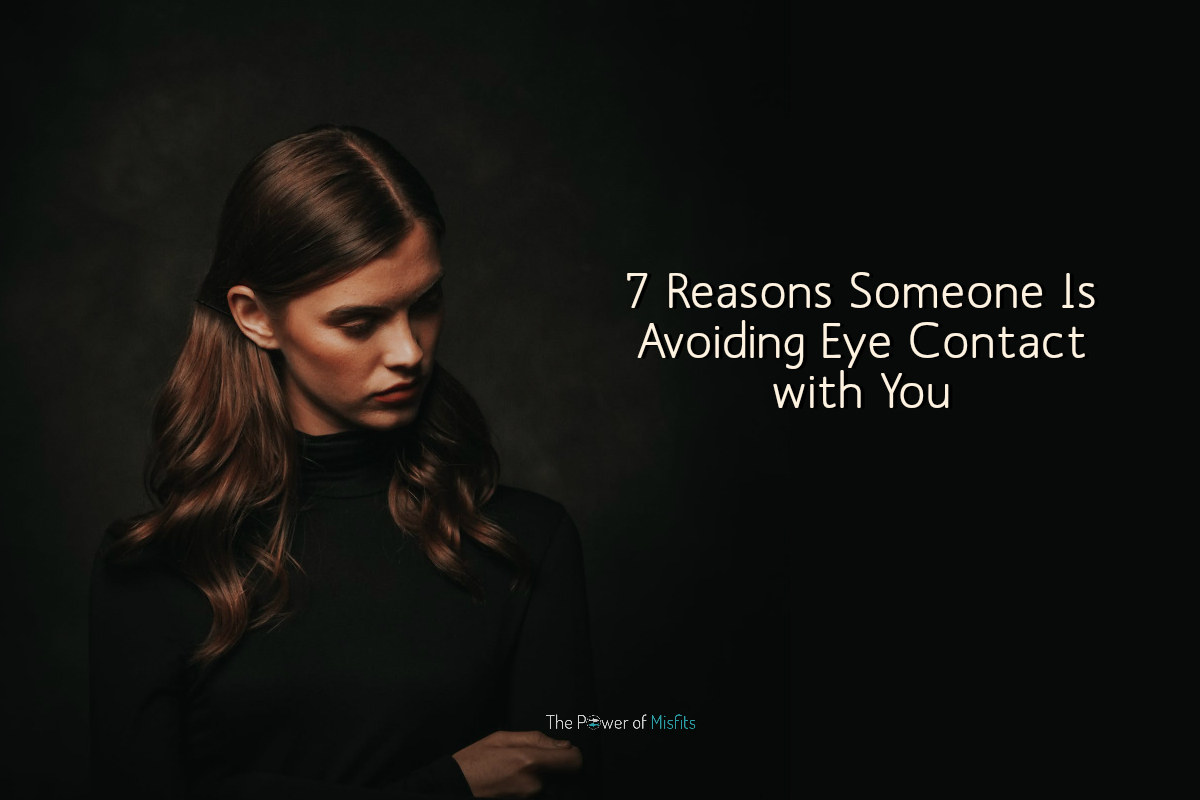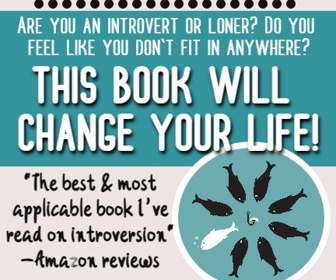Eye contact is an essential part of non-verbal communication. It makes us feel understood and listened to.
So what does it mean if someone has the habit of avoiding eye contact in a conversation?
This body language cue could reveal a few things about a person. Let’s talk about the reasons for the lack of eye contact and offer possible solutions in case if you are the one who struggles with looking people in the eye.
7 Reasons Someone Is Avoiding Eye Contact with You
1. They are shy and insecure
The most common reason for the lack of eye contact is low self-esteem.
When you have insecurities, you feel inferior to others and this often makes you want to be ‘invisible’ to those around you. You suffer from the so-called ‘spotlight effect’ where you tend to think that other people notice every bit of what you do and say.
So, the less visible you are, the safer you feel. When looking people in the eye, you might feel exposed, as if they are going to see through your perceived worthlessness. This is why you will unconsciously avoid eye contact.
In essence, low self-esteem tricks you into feeling intimidated by other people. Since a shy and insecure person lacks assertiveness, they tend to find eye contact too overwhelming.
2. They are feeling superior to you
Avoiding eye contact may reveal quite the opposite too. A person who doesn’t look others in the eye could feel superior to them. They could believe that they are far more important, smart, and accomplished than those around them.
So if someone doesn’t look at you at all while talking, they could think that you are too insignificant to turn their gaze to you. It’s as if they are saying,
“You don’t seem interesting or important enough to me”.
3. They have social anxiety or autism spectrum disorder

Autistic people struggle with both verbal and non-verbal communication. Atypical eye contact is a telling sign of autism spectrum disorder.
Recent studies demonstrated that autistic individuals had a preference for faces with averted gaze. Therefore, avoiding eye contact seems to be an involuntary response to the face stimuli they struggle to process.
Those with social anxiety also have a difficult time in social situations. Just like people with low self-esteem, they have a distorted perception of themselves and others. They feel like whatever they do, other people will judge and reject them.
Social anxiety is often associated with a lack of trust, self-esteem issues, and fear of rejection. All these issues make interaction with others challenging and highly uncomfortable.
When a socially anxious person is in a social situation, they dwell on their fears and negative feelings instead of being engaged in the conversation. So they are both too afraid to look other people in the eye and too focused on their inner experiences.
4. They are hiding something
As we said above, the lack of eye contact often betrays the feeling of being exposed. But you don’t always experience this emotion because you are socially anxious or shy.
Sometimes you indeed have things to hide and don’t want to be exposed. However, it doesn’t necessarily have to involve lies – maybe you are hiding your feelings toward the person you are talking to.
Avoiding eye contact is sometimes associated with lying and deceptive behavior.
However, body language expert and former FBI agent Joe Navarro says that there are no studies to confirm this link. According to him, quite the opposite is true – liars often maintain eye contact for too long in an attempt to ward off suspicion.
5. You are making them uncomfortable

When someone avoids eye contact in a conversation over and over again, you could be making them uncomfortable. There could be many possible reasons for that.
Maybe you are asking too personal questions or bringing up topics they feel embarrassed about. It could be that the person has an opposing opinion to yours but doesn’t want to start an argument.
So they seek to wrap up the conversation and that’s why they involuntarily avert their eyes.
You might also be making them feel intimidated. Are you too loud and talking too much? Are you imposing your opinion on them? Whatever the case is, avoiding eye contact is a cue that the other person wants to escape the conversation as soon as possible.
Also, we have a natural tendency to avert our gaze from something or someone we don’t like. So if a person always seems to avoid eye contact with you, then most probably, they don’t like you.
Maybe they find you unattractive, boring, or annoying. There could be countless different reasons why people dislike one another. After all, you can’t get everyone to like you.
6. They like you and want to hide it
On the other hand, averting one’s eyes could also reveal attraction. It can happen if someone likes you but wants to hide it for some reason. So they unconsciously try to hide their eyes so that they don’t give away their true feelings for you.
For example, when a man avoids eye contact with a woman, he might already be engaged to someone else, and the attraction he feels to her seems wrong and causes guilt. Maybe he is unsure if he can trust her or is having second thoughts about his feelings. Or this man might just be too shy.
At this point, you may wonder how to interpret the lack of eye contact since it can have so many different meanings? What does it mean when someone avoids eye contact after all? Do they secretly like you or do they just find you boring and want to end the conversation?
In the case of attraction, the person will sneak a look at you from time to time. And if you pay attention, you will notice that these quick glances are full of interest.
But if they don’t like you or are bothered by something you do or say, they will barely look at you at all. And when they do, the expression of their eyes will be dull and indifferent.
7. They aren’t engaged in the conversation
Finally, one of the most common reasons someone avoids eye contact is that they are not engaged in the conversation, so their mind wanders off.
It could be that they don’t find the topic fascinating enough or are just bored in general. Maybe you are talking too much about yourself or something they are not interested in, and they are starting to get tired of the conversation.
We avert our gaze when we think deeply about something. So the person you are talking to could be pondering over something irrelevant. Most probably, they are not listening at all.
Of course, it doesn’t necessarily mean that it’s your fault that the other person is not involved in the conversation.
Maybe they are having issues of their own and are not in a mood for socializing right now. It could be that some problem occupies their mind and they can’t think about anything else.
How to Deal with Eye Contact Anxiety?

We discussed why someone avoids eye contact, but what to do if you are the one who has this problem? Do you suffer from insecurity or social anxiety and want to improve your non-verbal communication skills?
Below are a few ways to cope with eye contact anxiety:
1. Observe your responses
The first step is to figure out in what situations you feel most anxious and uncomfortable when looking other people in the eye. Ask yourself,
When and why do I avoid eye contact?
Does it happen when you talk to strangers? Or when you have a conversation with a person of the opposite sex? Or when you interact with someone you find nosy and annoying? Maybe you struggle the most in formal situations when you have to face figures of authority?
When you identify the pattern in your responses to different social scenarios, you will be able to get to the root of the problem.
2. Practice
Mastering social skills is impossible without practice. I understand that throwing yourself in at the deep end is not an option for a socially anxious person. So I’m not going to tell you to go out and talk to strangers out of a sudden.
But you can start small and practice in front of a mirror or with your family and friends. When you talk to a friend or family member, stay aware of how long your eye contact lasts. Make sure you maintain it for 4-5 seconds.
If you have social anxiety, a lack of trust could be among the reasons you avoid looking strangers and acquaintances in the eye. So it will be much easier if you start with practicing eye contact with the people you love and trust.
3. Build confidence in social situations
Your eye contact anxiety could arise from the overall lack of confidence in social settings. So except for practicing good eye contact, you also need to improve your self-confidence and social skills in general.
For example, you can use affirmations every time you find yourself in a challenging social situation. All you need to do is talk to yourself and repeat encouraging statements that promote the feeling of safety and self-confidence, such as:
- I feel confident about myself
- I’m a likable and interesting person
- I feel safe here
- I’m surrounded by good people
You can learn more in this article about affirmations for confidence. There are many more ways to increase your self-esteem in social settings, and you can find them in this guide to overcoming self-esteem issues.
4. Make a commitment

This method works well if you are a socially anxious introvert as this personality type is more likely to stick with plans and commitments.
Upon attending a social event, set a goal. If you struggle with maintaining eye contact, it could be something like:
- Looking people in the eye for at least 3 seconds
- Noticing their eye color
- Making sure I look at them and show interest as they talk
This way, you will feel like you have a promise to fulfill, so you will be more aware of your non-verbal behaviors. You can make a general commitment too. For example,
- Looking the cashier in the eye when saying ‘thank you’
- Being nice to strangers and looking right at them when they talk to me
- Focusing my gaze on people’s faces during social interaction
As you see, your social goals don’t have to be huge. Making such commitments will help you gain more control of your involuntary non-verbal reactions. You will also step beyond your insecurity without putting yourself in too challenging situations.
To sum up, if you have the habit of avoiding eye contact because of insecurity or anxiety, you need to start with small steps. Over time and with practice, you will realize that talking to people without averting your gaze comes much easier.


